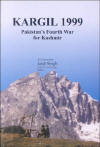|
| Home | About Kashmir Herald | |
Volume 1, No. 8 - January 2002 |
|
|
|
Lashkar-e-Toiba Literally
meaning "Army of the Pure", the Lashkar-e-Toiba has proved to be the
most brutal terrorist group presently active in Jammu and Kashmir. The
outfit is the terrorist arm of the Markaz Dawa-Wal-Irshad, an Islamic
fundamentalist organization. It
rose to prominence in ISI after 1997 (Nawaz Sharief's second term as
Prime Minister of Pakistan). After the Kargil fiasco, the outfit has
initiated a strategy of 'suicide attacks' where small groups of
fidayeen (suicide squads) would storm a security force camp and kill
as many personnel as possible. The outfit is reported to have changed
its name to Pasban-i-Ahle Hadith following their inclusion in the
US state department's Foreign Terrorist Organization list. The pan-Islamic militancy was introduced in Kashmir to infuse a fresh lease of life into the otherwise dwindling local militancy. And the best choice available then was Harkat-ul-Mujahideen - the militant wing of Moulana Fazlul Rehman Khalil's Jamiat-e-Ulemai Islam, Pakistan. The group was powerful and had a huge network of madarsas which it ran across the Pak-Afghan border. The group, however, became extremely powerful after its Talibs (students) took over Afghanistan. In fact, ISI soon realised that it was difficult to handle Khalil who enjoyed substantial clout in Pakistan's electoral politics and this is how the focus shifted to Lashkar. This
Lahore-based group is the militant wing of a purely religious group -
Markaz dawah-ul-Irshad led by Prof Hafiz Mohammad Sayeed and had
absolutely no stakes in Pakistan's domestic politics. "It seems Pakistan establishment too wants to keep Lashkar out of any US wrath. Lashkar enjoys excellent ties with the Pakistan military regime and thus as good guys they are listening to them.'' says a senior intelligence officer. Sponsors: "Groups like Lashkar and Jaish generally run on donations from rich Gulf and Saudis or on Pak Government's support,'' says an officer, who had investigated the cross-border funding to militants in Kashmir. ``The militant groups generally get the guns and other arms and ammunition from the Government sources across the border. They
don't need to purchase it at all from open market. And they manage funds
locally also. It is either consensual donations or extortion from local
businessmen or ransoms. This is apart from hawala channels which are
also very difficult to seal because of their complex nature''. Courtesy: For more information,
please visit: |
 |
 |
 |
|
| Archives
| Privacy Policy |
Copyrights
| Contact
Us | |
||